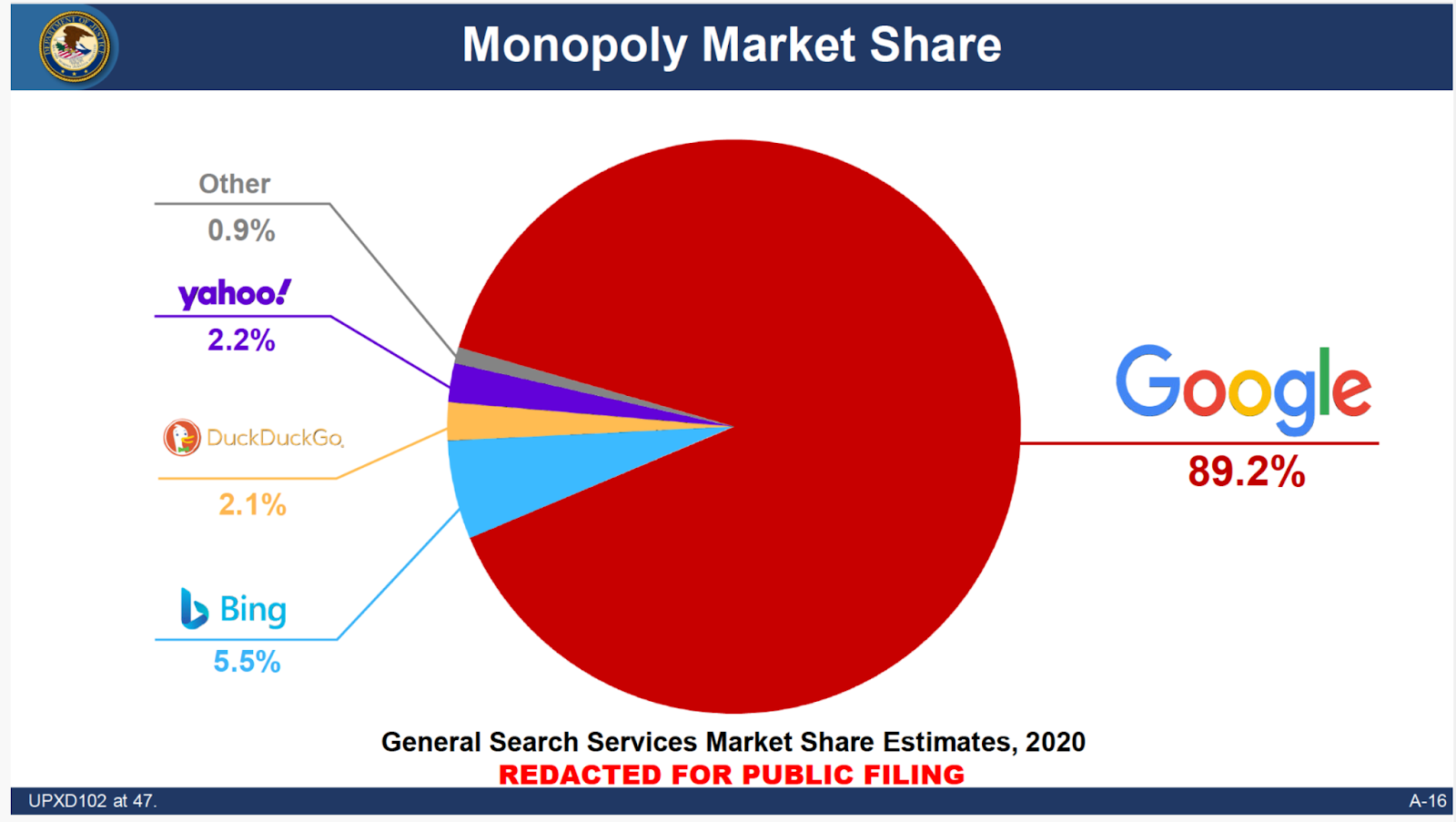Yesterday’s ruling by a federal U.S. judge that Google illegally held a monopoly in search and text advertising is a staggering defeat for one of the world’s biggest tech companies.
“After having carefully considered and weighed the witness testimony and evidence, the court reaches the following conclusion: Google is a monopolist, and it has acted as one to maintain its monopoly,” US District Judge Amit Mehta wrote in his ruling. “It has violated Section 2 of the Sherman Act.”
While it will be several months before Judge Mehta hands down the penalties, this decision goes to the heart of Google’s business. Whatever the judge decides could upend everything about search and search advertising. Google said it will appeal the ruling, so it will likely be years before we know the outcome.
If you’re wondering why the judge ruled as he did, here is the Department of Justice’s case against the tech giant in 11 slides it used for the closing argument.
Market share
The Federal Trade Commission defines a monopoly as “conduct by a single firm that unreasonably restrains competition by creating or maintaining monopoly power.”
Market share is the first thing courts consider when determining if a monopoly exists. While having a 50% market share can mean there is a monopoly, judges generally require at least a 60% to 65% market share.
That 89.2% is the average of desktop and mobile search. While that is very lopsided, it is even more so when you look at the two separately.
How was that market share gained?
The next criterion for determining monopoly is how the company achieved/maintained its dominant position. There would be no problem if this came by legitimate business practices — “a better product, superior management or historic accident,” to quote the FTC. As someone around when Google launched in 1998, I can attest that it was a gigantic improvement over other search engines. This is why, by 2002, the company had an 80% search market share.
But, is that how it maintained that position?
The Justice Department said it was because Google paid other companies to make its search engine the default setting.
Or, as Google itself put it:
In 2022 the company paid Apple $20 billion to be the default on iPhones — the chief competitor of Android, Google’s mobile phone operating system.
The DoJ said this not only preserved market share, it also prevented others from getting the data needed to create competitive search engines.
This data is so important to Google that it designed its Chrome browser to collect it even in the supposedly private Incognito setting.
The benefits
The DOJ said Google exploited its dominance to strong-arm other companies and set prices without having to worry about what competitors might do.
Search engine dominance made Google a prime location for digital advertising. Our colleague Danny Goodwin takes a deep look at that in his article “How Google harms search advertisers in 20 slides.” Google’s own documents showed the company was fully aware of what it had done.
Only Judge Mehta knows what the penalties will be. The most extreme possibility would be to force Google to sell its Chrome browser and/or Android mobile software businesses, preventing the company from directly integrating search into both. Also, important to note, there is another federal antitrust suit pending against Google. This one focuses on the company’s adtech business and is scheduled to start in September.
Related stories
New on MarTech
@media screen and (min-width: 800px) { #div-gpt-ad-6013980-7 { display: flex !important; justify-content: center !important; align-items: center !important; min-width:770px; min-height:260px; }
}
@media screen and (min-width: 1279px) { #div-gpt-ad-6013980-7 { display: flex !important; justify-content: center !important; align-items: center !important; min-width:800px!important; min-height:440px!important; }
}
.avatar-border { border: 3px solid #ee3024; } .badge-color { border: 1px solid #ee3024 !important; background-color: #ee3024 !important; }





